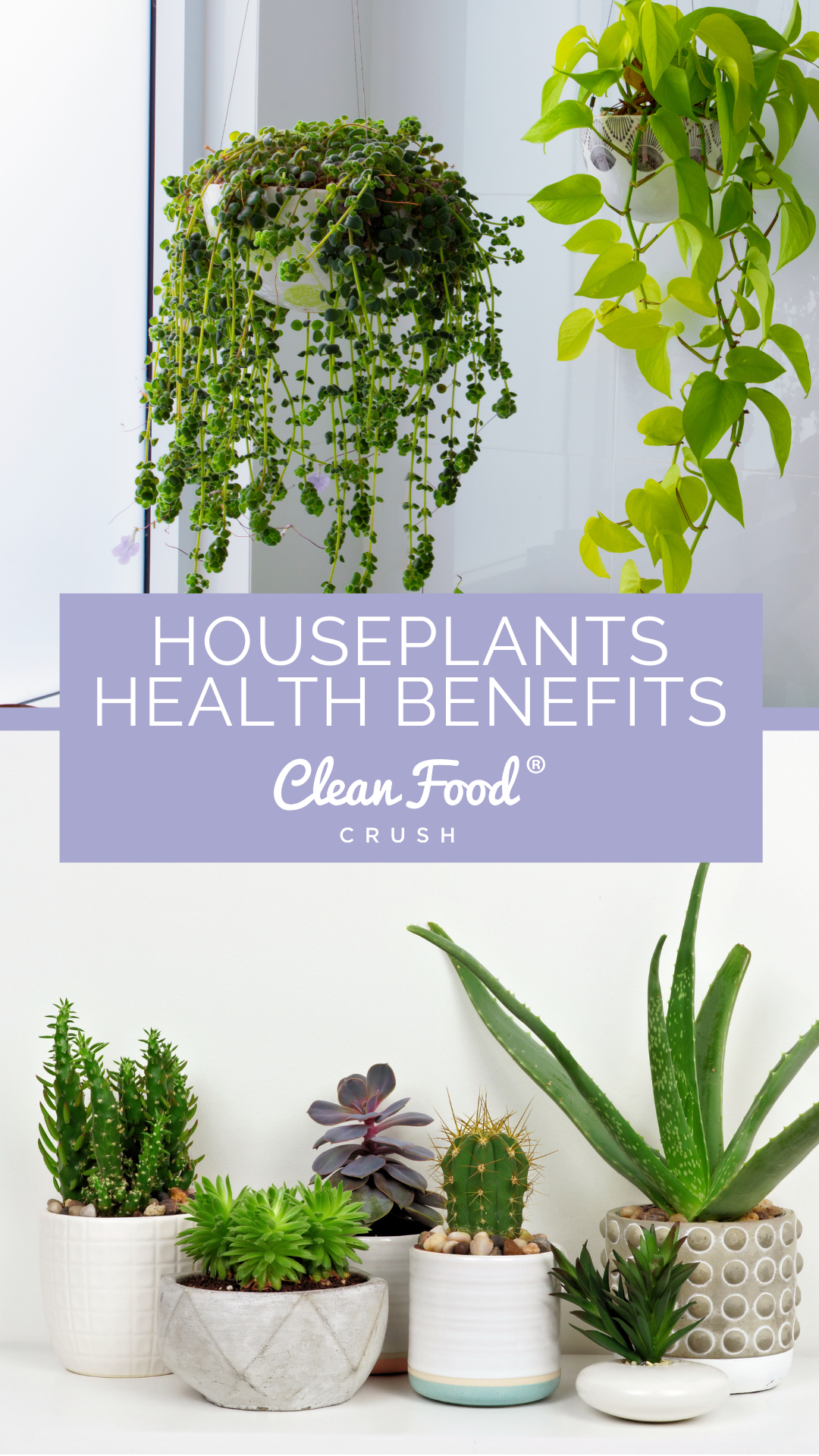

HOUSEPLANTS AND THEIR HEALTH BENEFITS
Did you know your environment can have a huge impact on your well-being? Cleanliness, organization, the right temperature, decorations, and yes, even indoor gardening can have powerful effects on your mental and physical health.
Houseplants can improve your health by boosting your mood and productivity, helping your immune system, providing nutritional herbs and spices, and cleaning the air you breathe. Thankfully, caring for these plants doesn’t have to be overwhelming or difficult.
Below are ten common houseplants, the health benefits they offer, how to care for them, and if your pets can safely nibble on them. I hope you can use this as a guide for adding some greenery to your home decor!

SNAKE PLANT
The snake plant is arguably one of the most popular houseplants, and for good reasons! It doesn’t need much attention, which is great news for those of us without green thumbs or for a starter plant, and it improves the air quality of your home by removing many toxins including trichloroethylene, benzene, and formaldehyde. The plant also releases oxygen at night helping you sleep much better, which is essential to overall health.
For optimal use, get multiple snake plants. Put a few in your bedroom, living room, and office if you have one. They do best in indirect sunlight, so just be sure there’s a window near the plant, though it doesn’t have to be directly in front of it.
In addition to indirect sunlight, snake plants don’t need much watering. They tend to grow better if you let them dry out quite a bit between watering, which should happen every 2-8 weeks. I know, that’s a big window of time. This is because the schedule will vary depending on your home environment, soil type, amount of sun exposure, and pot size.
Ⓧ – This isn’t the most dangerous plant for your pets, but it is mildly toxic to both cats and dogs. It contains saponins, a natural chemical produced to protect itself from insects, microbes, and fungi, which can cause gastrointestinal upset in pets. So, be sure to keep this plant away from your furry children.
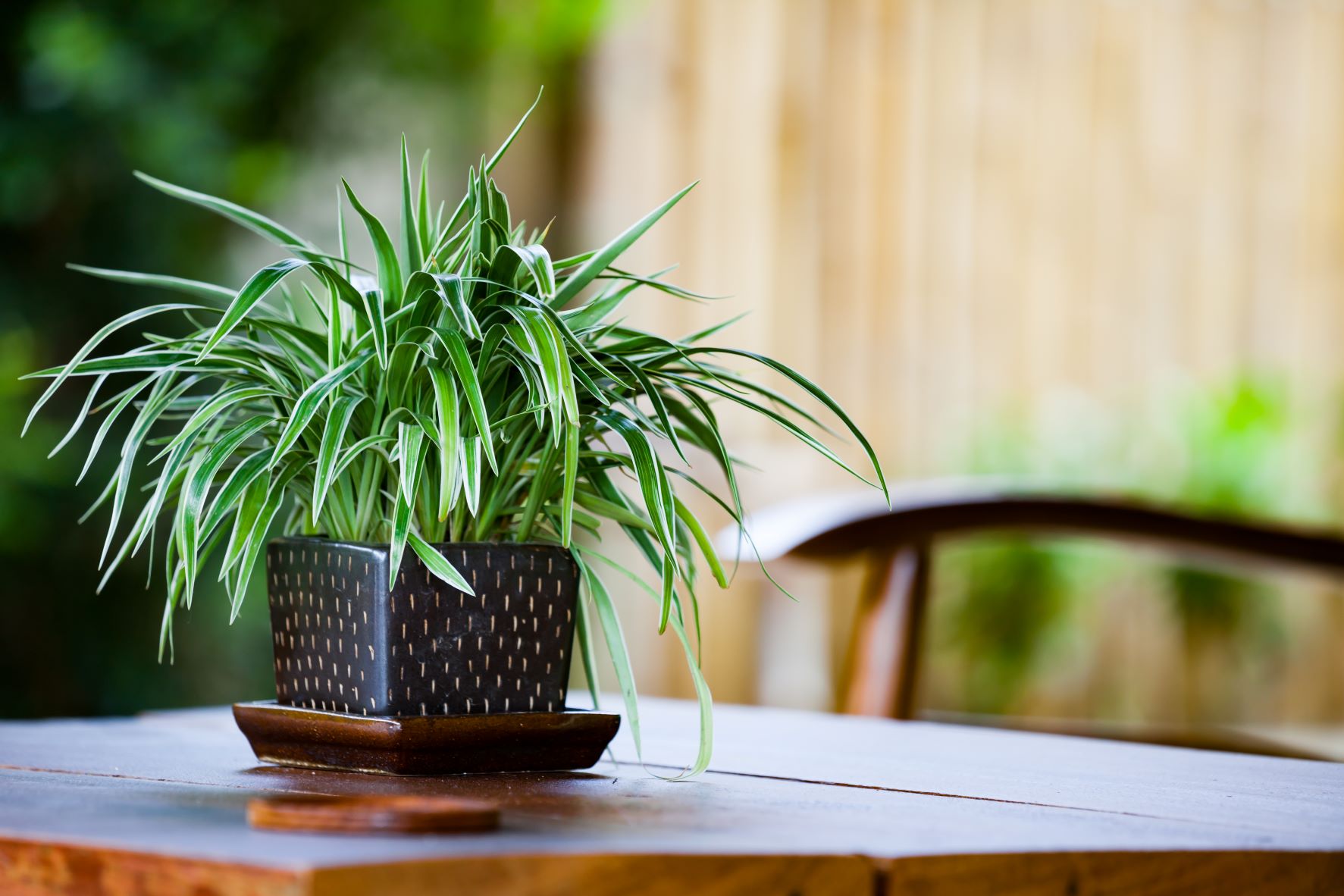
SPIDER PLANT
If your air quality isn’t the best, you have allergy-like symptoms, or you don’t have the best luck keeping plants alive, then a spider plant may be exactly what you need. Spider plants are fantastic at purifying the air by removing formaldehyde (which can cause watery eyes, itching, and burning nose and throat, coughing, wheezing, and skin irritation) and other toxic impurities.
These are difficult plants to kill and can be kept in less sunny places since it doesn’t like direct sunlight. It also likes humidity and temperatures between 55 and 80°F, making it a great addition to your bathroom or kitchen. Be sure your spider plant is in a well-draining pot and gets even moisture, not too dry or too wet.
🐾 – This plant is safe for your furry friends! However, don’t add the leaves to your cat’s dinner because it can make them mildly ill, especially if they eat too much of it.
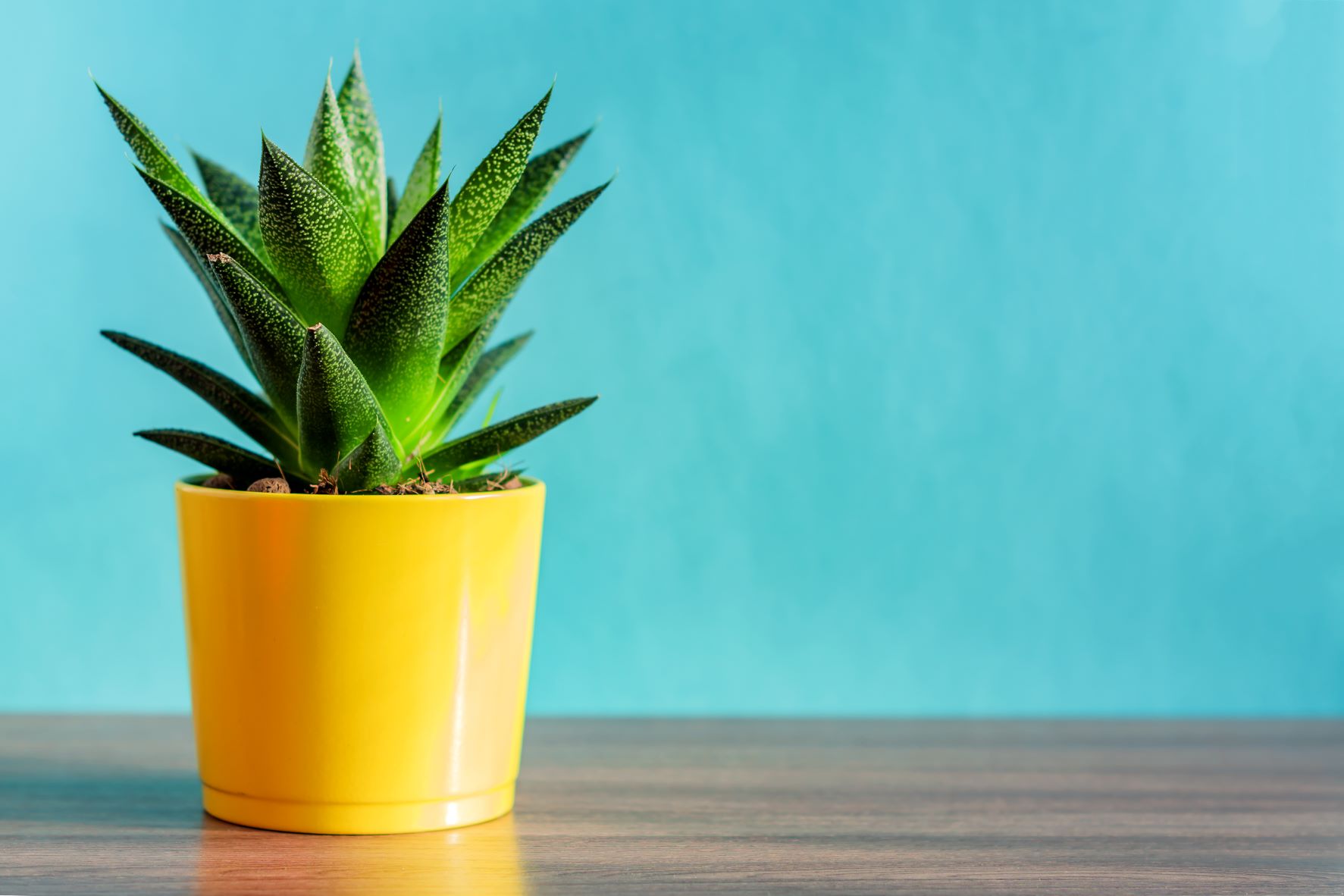
ALOE VERA
If you’ve ever suffered from a mild burn or found yourself sunburnt (remember to always wear sunscreen!) then you’ve probably heard of and used aloe vera. There have only been a few scientific studies on the medical properties of aloe vera but it’s been used as a natural remedy for skin irritations for hundreds of years.
Keep an aloe vera plant under a window both for decoration and in case you ever need a quick and natural treatment for burns, sunburns, frostbite, psoriasis, and cold sores! (Contact your doctor if you have serious injuries, medical concerns, or allergies.) They do best with lots of sun, but not constant direct light or they’ll turn brown. That’s why indirect sunlight (such as under a window) is ideal.
Water your aloe plant deeply but infrequently, letting the soil dry between waterings. The roots will rot if the soil stays overly wet so plan to water it about every 2-3 weeks in the spring and summer and even less in the fall and winter.
Ⓧ – Aloe Vera is toxic for dogs and cats with a mild to moderate toxicity level. So keep it out of reach of your curious kitten.
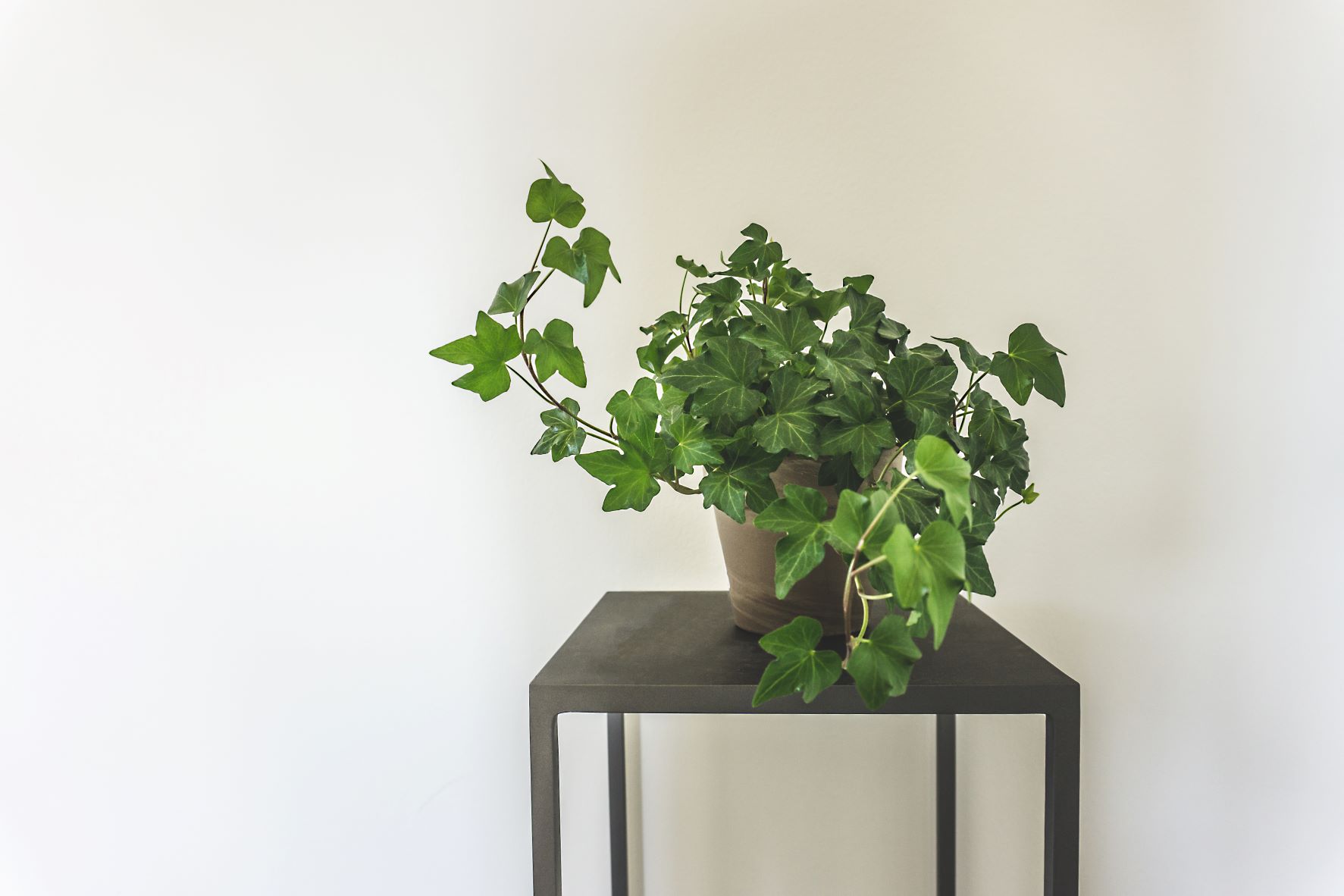
ENGLISH IVY
Do you hate even the idea of finding mold in your home? If the answer is yes, then consider getting yourself some English ivy! Just having the plant inside can help calm any anxiety about mold creeping into the house because English ivy purifies up to 94% of airborne mold particles that can trigger allergies. So while this plant shouldn’t be your only defense against mold, it can help!
This is another great plant to put in your bedroom, where it can aid in easier breathing for a restful night’s sleep. The ivy flourishes under fluorescent light but not direct sun, so it’s perfect for rooms with more artificial light than sunlight. Keep the soil is damp, but without standing water in the pot’s saucer. A good rule of thumb is to give your English ivy about one inch of water a week.
Ⓧ – Do not let your pets consume this plant, as it’s poisonous. Also, keep it out of reach of children who tend to put plants in their mouths.
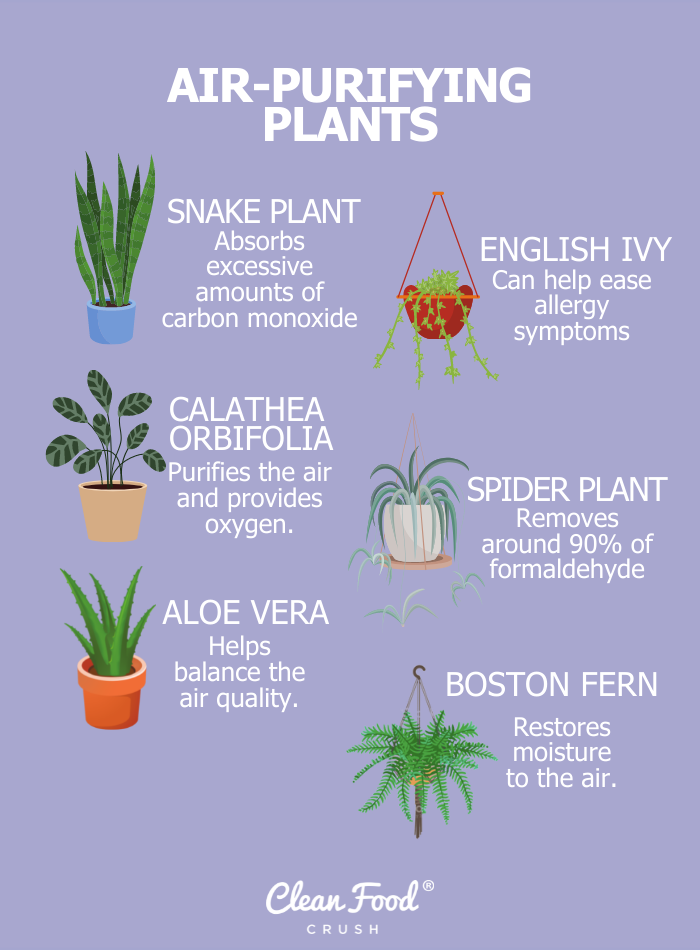
THYME
It may not be a surprise to learn we LOVE natural herbs here at Clean Food Crush. Growing your own can be fun, tasty, fulfilling, and easier on the wallet. If you want to try your hand at growing herbs, try starting with thyme either outside, on your porch, or by a window, as they need direct light.
Thyme is full of vitamin C, which is necessary for all body tissues’ growth, development, and repair. It’s also a good source of vitamin A, which is important for normal vision, the immune system, and reproduction, copper, fiber, iron, and manganese. That’s not to mention the pleasing fragrance and delicious flavor it can add to your meals!
If you’re sold and plan to get yourself some thyme, be sure you plant it somewhere with plenty of light. It also needs regular watering (especially if it’s outside in hotter temperatures) and proper draining.
🐾 – This plant is safe for your furry friends!
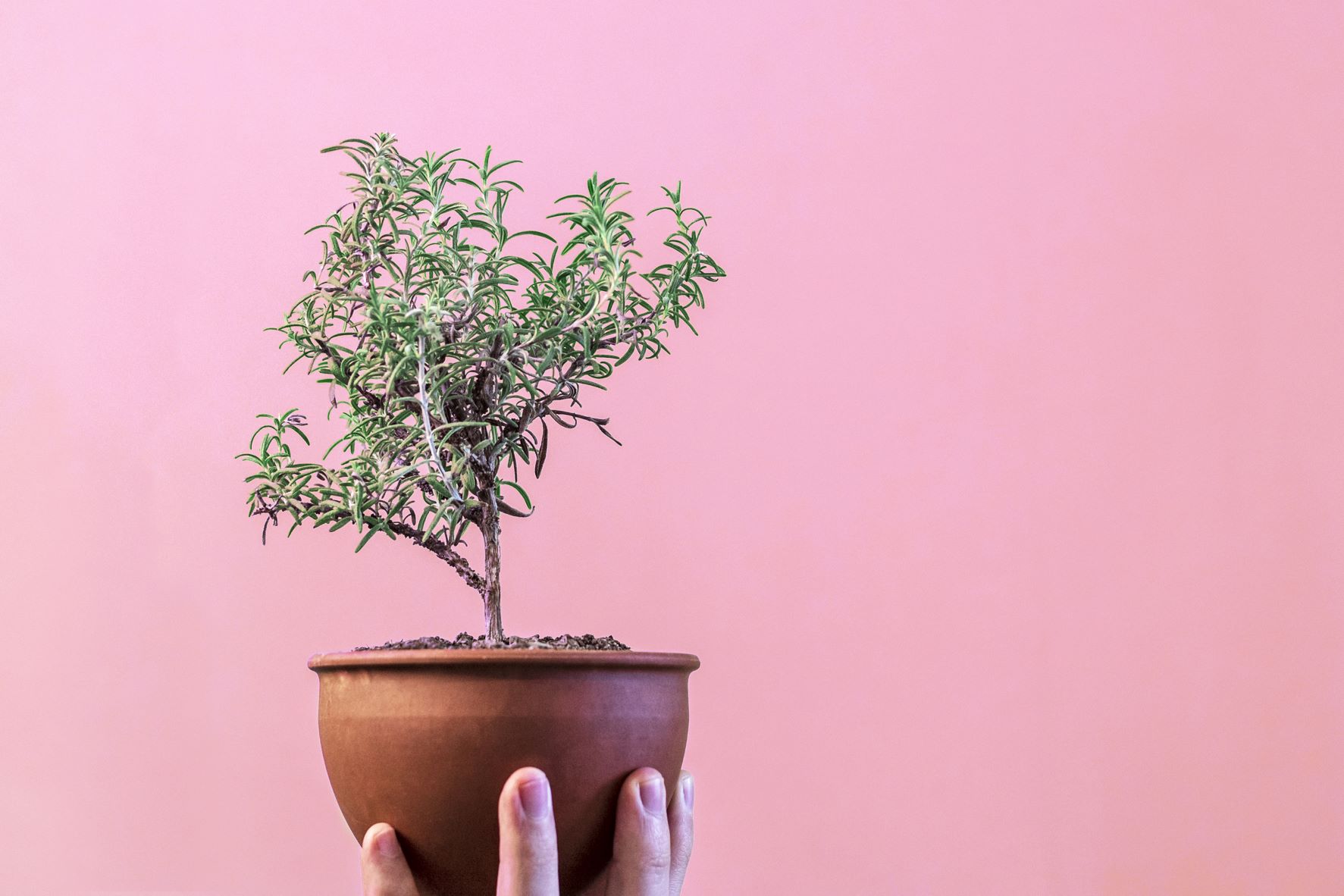
ROSEMARY
Another excellent herb to grow at home, rosemary is a fantastic source of anti-inflammatory compounds and antioxidants, both of which help boost the immune system and improve blood circulation. In addition, this herb can aid in enhancing memory, focus, and intelligence.
Like thyme, rosemary needs plenty of sun, about 6-8 hours a day, and should never be over-watered to avoid root rot. Depending on the plant’s environment, you’ll want to water your rosemary once every 2-4 weeks. I suggest planting it outside, either in a garden or a pot.
🐾 – This plant is safe for your furry friends!
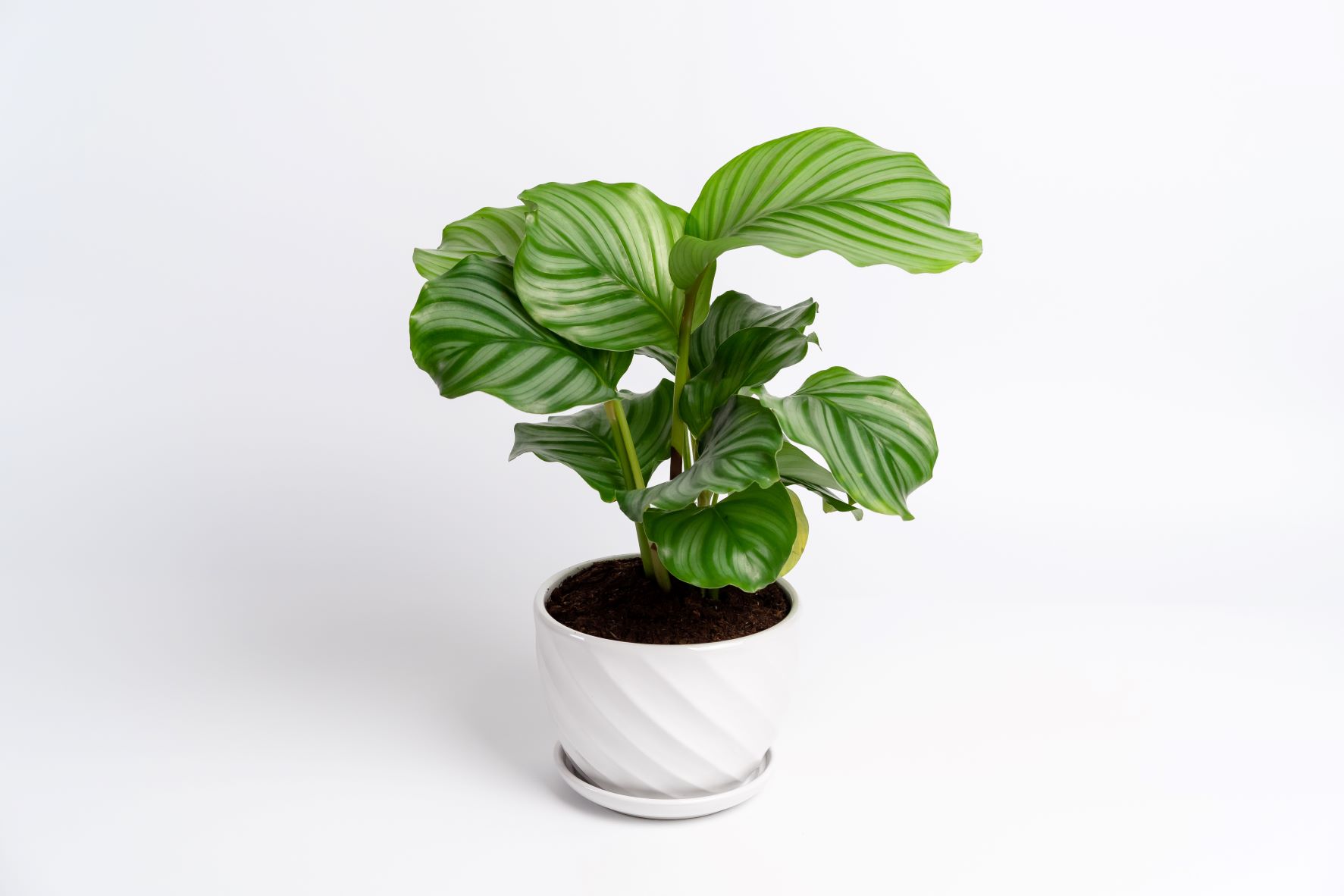
CALATHEA ORBIFOLIA
I’ve mentioned many other plants that purify the air, and the calathea orbifolia is another that will make your indoor climate even healthier. It’s also a true beauty and a good choice for those with little to no plant experience!
The calathea plant doesn’t need direct sunlight. In fact, it prefers partial shade because if it gets too much sun, the leaves will begin to burn, making it a perfect plant for a bookshelf, on your desk, or in the bathroom. It also prefers cooler rooms (60-80°F) and humidity. Be sure the pot is well-draining, then maintain moist soil with regular watering, but do not let the soil become soggy.
🐾 – This plant is safe for your furry friends!
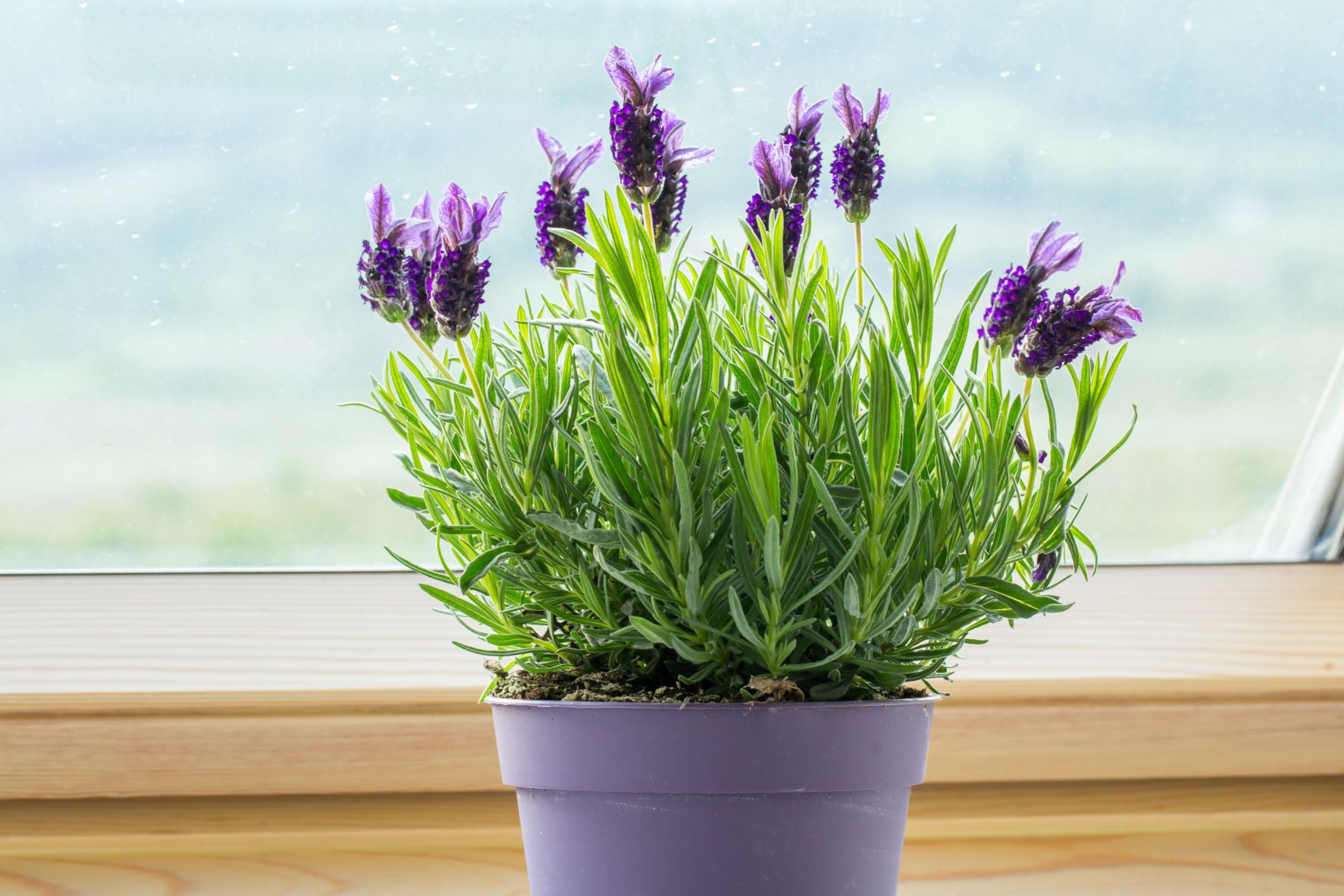
LAVENDER
The flowering plant has a pleasant aroma and is well-known for its stress-relieving and calming benefits. You may already be enjoying lavender in candles, soaps, essential oil diffusers, or bath salts so why not go right to the source?
A lavender plant can thrive anywhere in your home, but I suggest putting it in your bedroom. One of the best health benefits this plant has to offer is its aid in improving sleep quality by creating a relaxing atmosphere and soothing anxiety, restlessness, and depression.
Be sure the plant gets sunlight and the soil is able to drain properly. They flourish with at least eight hours of direct sunlight a day and deep watering, though not over-watering. Aim to water your lavender when the soil is nearly dry, usually every 2 weeks.
Ⓧ – Do not let your pets consume this plant. It contains a small amount of linalool, which is toxic to dogs and cats. Ingesting large amounts can cause many illnesses.
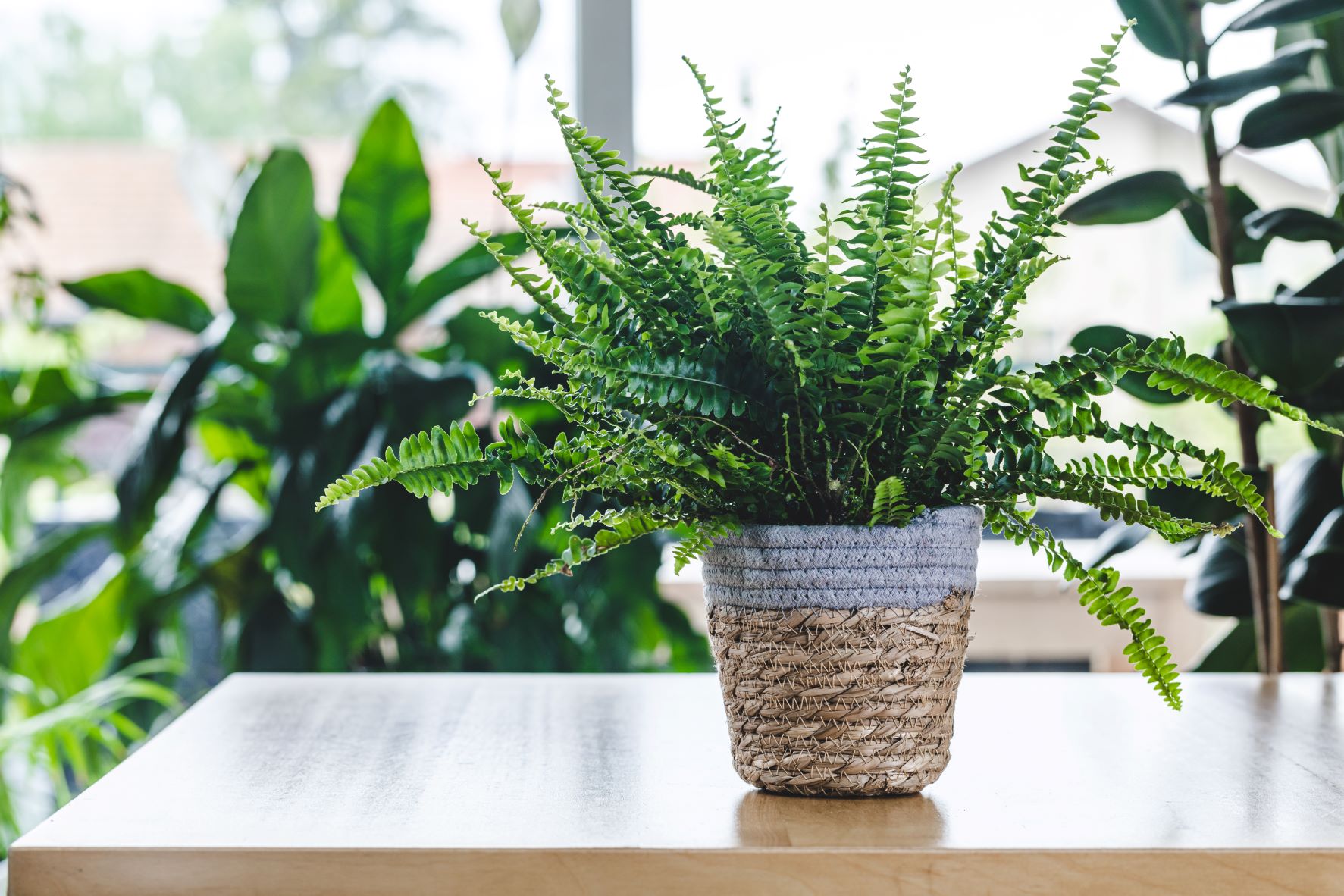
BOSTON FERN
Does your skin get dry and irritated quickly? Are your lips often chapped and eyes dry and irritated? These may be caused by low humidity and not enough hydration. First, it’s essential to drink more water, but you can also bring a Boston fern into your home! These are natural humidifiers and among the best air-purifying plants. Like snake plants, Boston ferns combat formaldehyde, xylene, and other unwanted toxins.
Set your fern up in an air-conditioned room of your house, such as a bedroom or living room, because they prefer a room temperature living environment (55-75°F). They also need indirect light and dappled shade, so don’t leave your ferns on the front porch.
Water your Boston fern regularly, as they need consistently moist but well-drained soil. The watering frequency will change based on temperature, humidity in your home, the pot, and sun exposure. Generally, you should water the fern 2-7 times a week when the soil is only slightly damp, as you don’t want it to dry out.
🐾 – This plant is safe for your furry friends! You may even find your kitten is tempted by the shaggy fronds of the fern, wanting to chew on them. Thankfully, the foliage is non-toxic to dogs and cats!
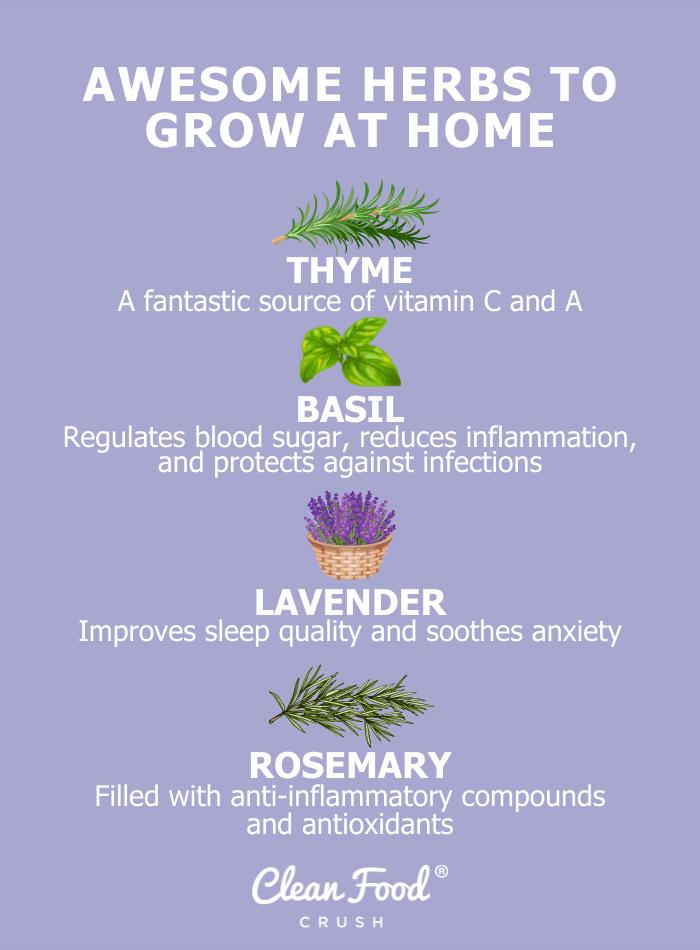
BASIL
Last but not least, one of my absolute favorite herbs: BASIL!
Basil is delicious, colorful, and highly nutritious. There are several varieties, but sweet basil is the most common and widely used. It is packed full of vitamins, minerals, and antioxidants such as lutein, zeaxanthin, beta-carotene, and beta-cryptoxanthin. Because of this, there are many health benefits, including blood sugar regulation, improving mental health, inflammation reduction, and protection against infections.
Basil loves direct light and warmer temperatures, so plant it either outside or by a window. It also likes to stay moist with about an inch of water a week, so the soil doesn’t dry out.
🐾 – This plant is safe for your furry friends!
There you have it! Ten awesome plants and the benefits they can have on your health.
An average home carries many dangerous toxins, such as formaldehyde, carbon monoxide, trichloroethylene, and ammonia, and houseplants can absorb up to 90% of these pollutants. I don’t know about you, but these are some helpers I definitely want on my side.
Plus, planting your own herbs is an awesome way to fall more in love with cooking healthy, delicious meals!















